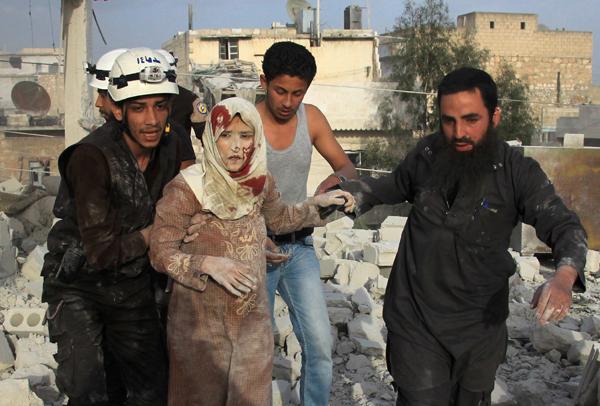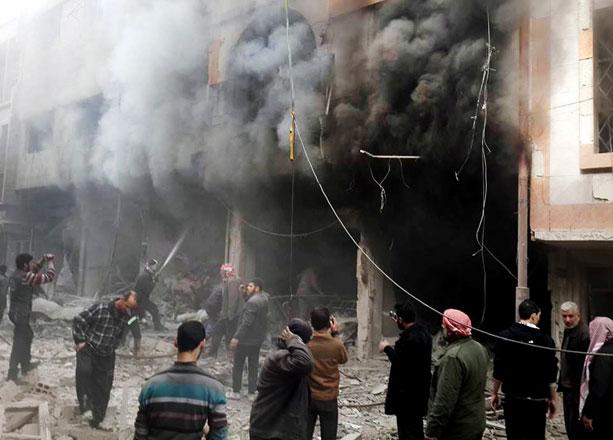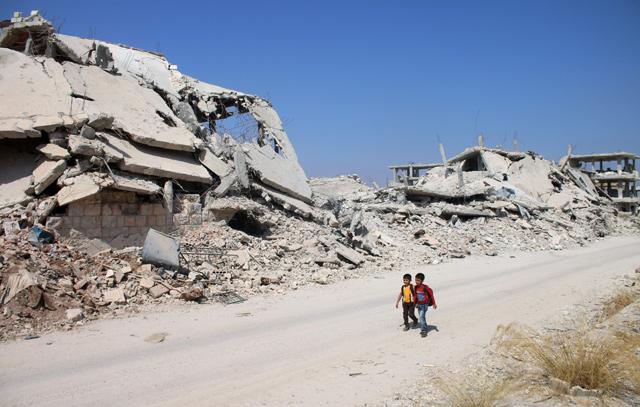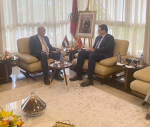You are here
Syrian rivals race to retake territory from extremists
By AFP - Apr 10,2016 - Last updated at Apr 10,2016

Syrian rescue workers and residents help an injured woman following a reported air strike by government forces on the rebel-held neighbourhood of Haydariya in the northern city of Aleppo on Sunday (AFP photo)
BEIRUT — The Daesh terror group is under growing pressure on several fronts in Syria as rival forces battle to wrest territory from the extremists, who are excluded from a six-week-old ceasefire.
The scramble by the regime, anti-government rebels and Kurdish militia to recapture areas from Daesh has been given added urgency by the prospect of a possible federal system.
"The three sides are racing to grab as much of the pie as possible, not just at the expense of the Islamic State group [Daesh] but also ... from other key players," said Thomas Pierret, a Syria expert at the University of Edinburgh.
The extremists have suffered a series of setbacks in Syria in recent weeks, losing the ancient city of Palmyra and the Daesh bastion of Al Qaryatain, both in the central province of Homs, to Russian-backed government forces.
In the northern province of Aleppo, US- and Turkish-backed rebels have seized the town of Al Rai, the extremist group's main entry point from Turkey.
In the south, meanwhile, rival extremists from Al Qaeda-affiliated Al Nusra Front and their rebel allies have captured three towns from Daesh.
And in the northeast, the mainly Kurdish Syrian Democratic Forces are pressing an advance towards the oil-rich province of Deir Ezzor, which the regime also has its sights set on.
Sharing the pie
With a new round of peace talks due to get under way in Geneva on April 13, experts say the scramble for territory has taken on increasing importance.
When the regime recaptured Palmyra, "it understood the diplomatic advantage it would gain in negotiations" with the opposition, Pierret said.
Rebels trying to advance along the Turkish border, meanwhile, have twin aims — pushing back Daesh and preventing Kurdish militias from expanding their territory, he said.
"For the moment, the pie is big enough for everyone" fighting Daesh, Pierret added.
"The coming stages will be more complicated: to the east of Aleppo, there are areas that the regime, the Kurds and the rebels are interested in controlling."
It is easy to see the allure of Daesh-held turf — which covers about 40 per cent of Syria, and is rich in oil, gas and agricultural wealth.
But with every victory over Daesh, there is a growing risk of renewed confrontation between non-extremist rebels and the regime, who have observed a fragile ceasefire since February 27.
"I don't think the Russians and the Americans will be able to stop their allies from fighting each other forever," said Romain Caillet, a French expert on extremist movements.
The truce brokered by Washington and Moscow has brought a lull in clashes between the regime and non-extremist rebels.
In the unlikely event that the extremists’ enemies continue to refrain from fighting each other, the recapture of Daesh territory "will see the organisation return to totally clandestine activity", Caillet said.
Raqqa, the prize
Syria's regime and opposition categorically rejected a Kurdish declaration in March of a federal region in areas under their control in the country's north.
But their backers Russia and the United States are not opposed to such a plan, according to Fabrice Balance, a visiting fellow at the Washington Institute.
"The United States and Russia seem to agree on federalism for Syria," the Syrian expert said.
"One way to weaken Assad is to agree on the distribution of zones of influence."
With Daesh on the defensive, the big question now is: who will be the first to recapture Daesh's de facto Syrian capital Raqqa?
A diplomat from a European nation participating in the US-led anti-Daesh coalition said there would be consequences for the opposition and its Western supporters if Russian-backed regime forces seize the militant stronghold.
"If the Russians and the regime do take Raqqa, we do consider it will be a critical step. It will prove that they have won the war, to be frank, and that the opposition is only a small pocket in the north," the diplomat said.
Related Articles
BEIRUT — At least 34 civilians were killed on Tuesday in suspected Russian air strikes on two markets in northern Syria, a monitoring group
TEHRAN — Syria's defence minister is to hold Tehran talks with his Iranian and Russian counterparts on Thursday as government forces press a
BEIRUT, Lebanon — The capture of Eastern Ghouta is a significant milestone for Syria's regime and paves the way for government troops to shi


















